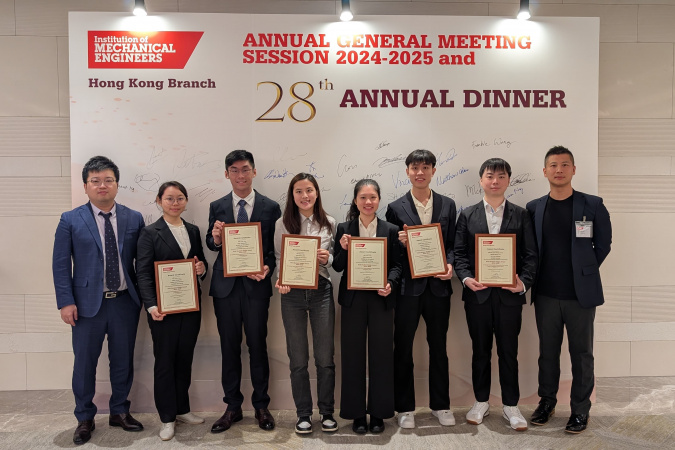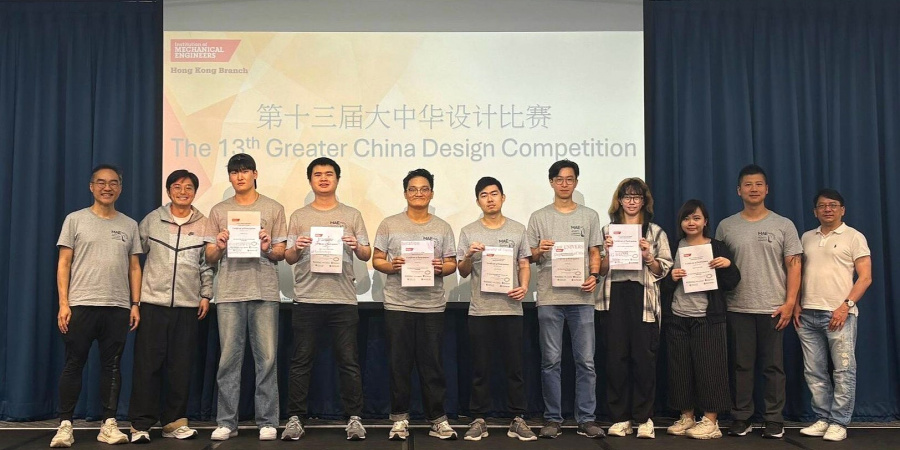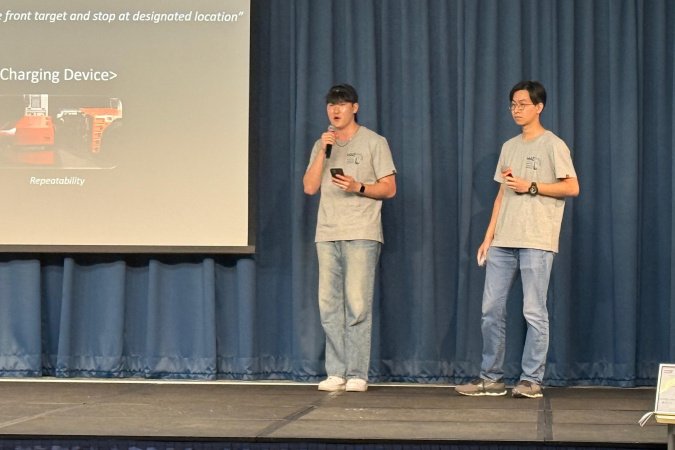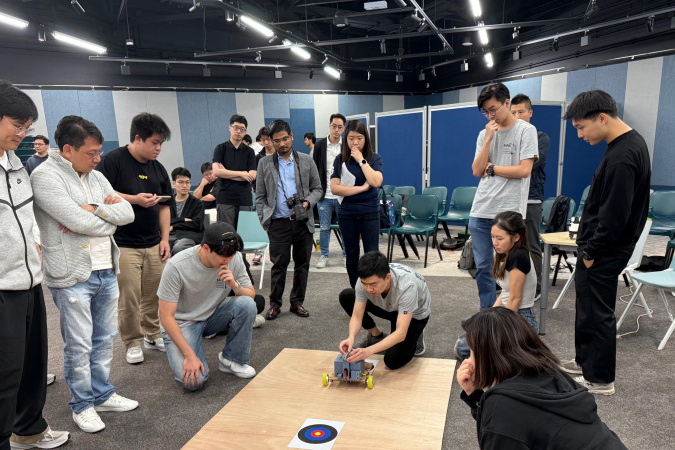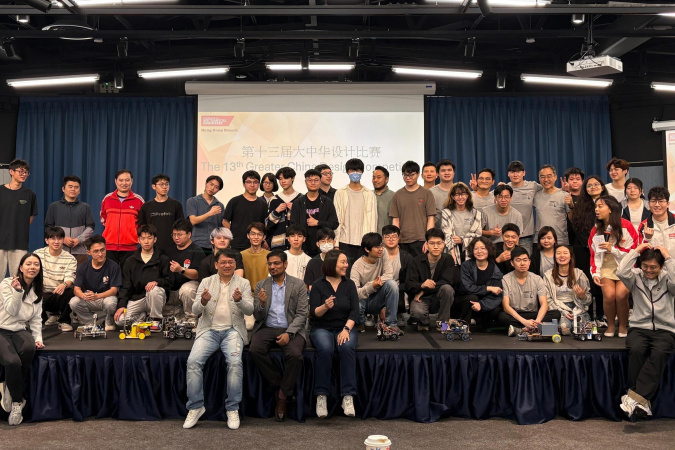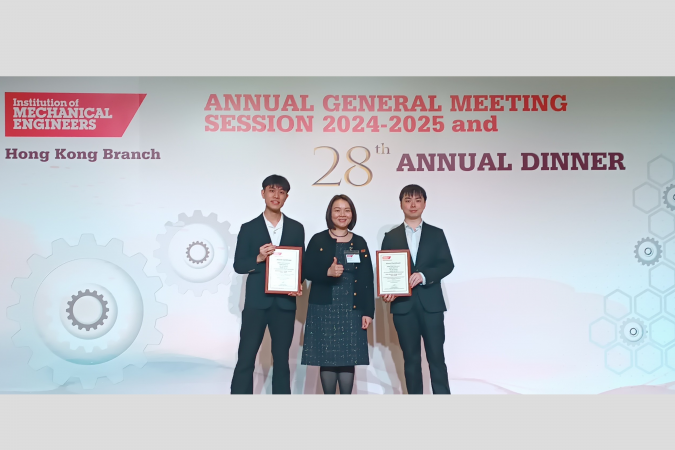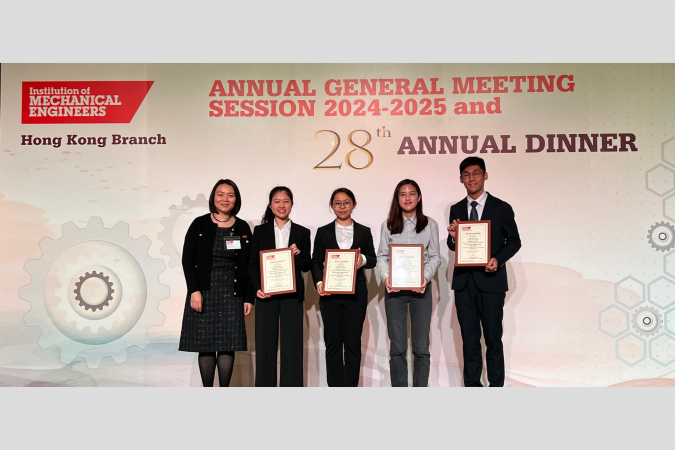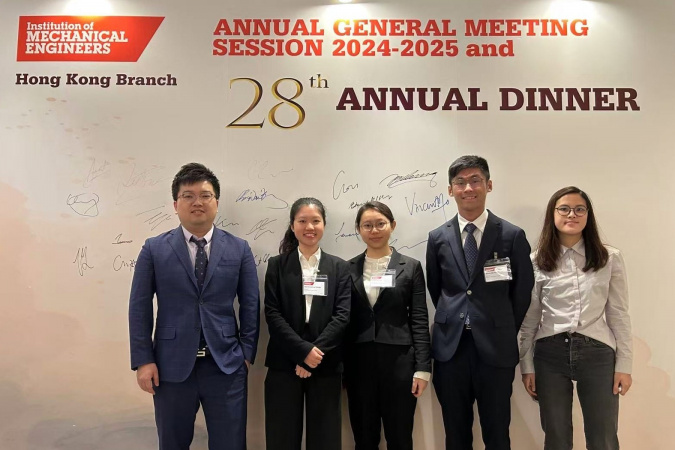MAE Students Won Championship of IMechE Greater China Design Competition 2025 and IMechE HK Branch Best Student Design Award 2024-25
The 13th IMechE Greater China Design Competition 2025
Our Mechanical engineering student team consists of Wang Ip LI (MAE UG student), Hyunsu PARK (MAE UG student), Wai Pang YIM,(MAE UG student), Gabriel Jonathan Matthew HOSEA (MAE UG student), Fai Yuek CAI (MAE UG student), Indhira Candrika Prajna RAHAYU (MAE UG students), Nicole Cho Sin CHAN (MAE PhD student), Supervised by Prof. Robin Ma and Dr. Stanley Leung has recently clinched the Championship title at the 13th IMechE Greater China Design Competition for the second consecutive year which organized by IMechE HK branch on 26th April 2025 at HKUST Campus. Their winning device, celebrated for its uniquely simple design, outshone competitors in a field where complexity often takes centre stage.
The IMechE Greater China Design Competition challenges engineering students to solve real-world problems through innovative design. The theme of this year is "Automated EV Charing". Teams from 5 tertiary institutions, namely the Hong Kong University of Science and Technology, Hong Kong University, Hong Kong Institute of Vocational Education, South China University of Technology, and Guangzhou City University of Technology have participated in this competition. The participating Teams were tasked with creating a device to simulate an autonomous robotic charging system—a problem demanding precision and reliability. Our team’s solution was a traveling device that turned heads with its elegant simplicity, using a precision mechanical structure to achieve repeatable movement along a straight path without close loop control.
What made HKUST team's device truly unique was its minimalistic approach. While others leaned on intricate systems, our team stripped ours design to its essentials, delivering complex functionality with remarkable ease. This simplicity not only met the competition’s rigorous standards but also showcased a level of ingenuity that earned them top marks from the judges.
IMechE HK Branch Best Student Design Award 2024-25
Two groups of MAE final year undergraduate students supervised by Prof. Yanglong Lu and Prof. Yanguang Zhou respectively, received the IMechE Best Student Design Awards 2024/25 by the IMechE Hong Kong Branch for their final year design project. The team representatives attended the award ceremony and received the award in the IMechE Hong Kong Branch Annual Dinner at the Hopewell Hotel on 15 May 2025.
About the project:
• “AI-enabled Virtual Representation for 3D Bioprinting of Diseased Model” by MO Yuet Yau, CHEUNG Hoi Ching, TSOI Shing Chi, YEUNG Hoi Yi Audrey (Supervisor: Prof. Yanglong LU)
Our project develops a low-cost bioprinter aimed at making advanced biofabrication more accessible to small research labs and academic institutions. Unlike expensive commercial systems, their custom-built printer supports multi-material printing and integrates cutting-edge machine learning to monitor print quality in real time.
The system reconstructs a 3D virtual model of each print, which is then analyzed through simulation software to assess functionality and structural integrity. If defects are detected or predicted, the machine learning model makes dynamic adjustments to the G-code and print parameters—improving print outcomes without human intervention. By combining affordability with intelligent automation, this innovation could democratize access to high-quality bioprinting and accelerate breakthroughs in tissue engineering and medical research.
• “An Energy-Saving Passive Evaporative Eco-Cooling Paint for Buildings in Hong Kong” by KWAN Chak Fung Kevin, HO Yat Cheung, LEUNG Pak Hei, WONG Wing Yat (Supervisor: Prof. Yanguang ZHOU)
To address the global warming and high demand of cooling, passive cooling technologies offer a promising alternative that can reduce the power consumption of air conditioning. These technologies require no electricity and do not produce any greenhouse gas emissions.
This project proposes the development of an innovative passive cooling technology: Evaporative Eco-Cooling Paint. The principle of this cooling paint is absorbing atmospheric water moisture into liquid form at low temperatures when at night and releases it in water vapour form at higher temperatures, thereby cooling the surface through evaporation. This approach is particularly well-suited for high-humidity environments like Hong Kong and provide a sustainable solution that reduces the power demands and environmental impacts associated with building cooling systems. By exploring this innovative technology, we aspire to contribute to a more sustainable future for urban cooling in Hong Kong.
